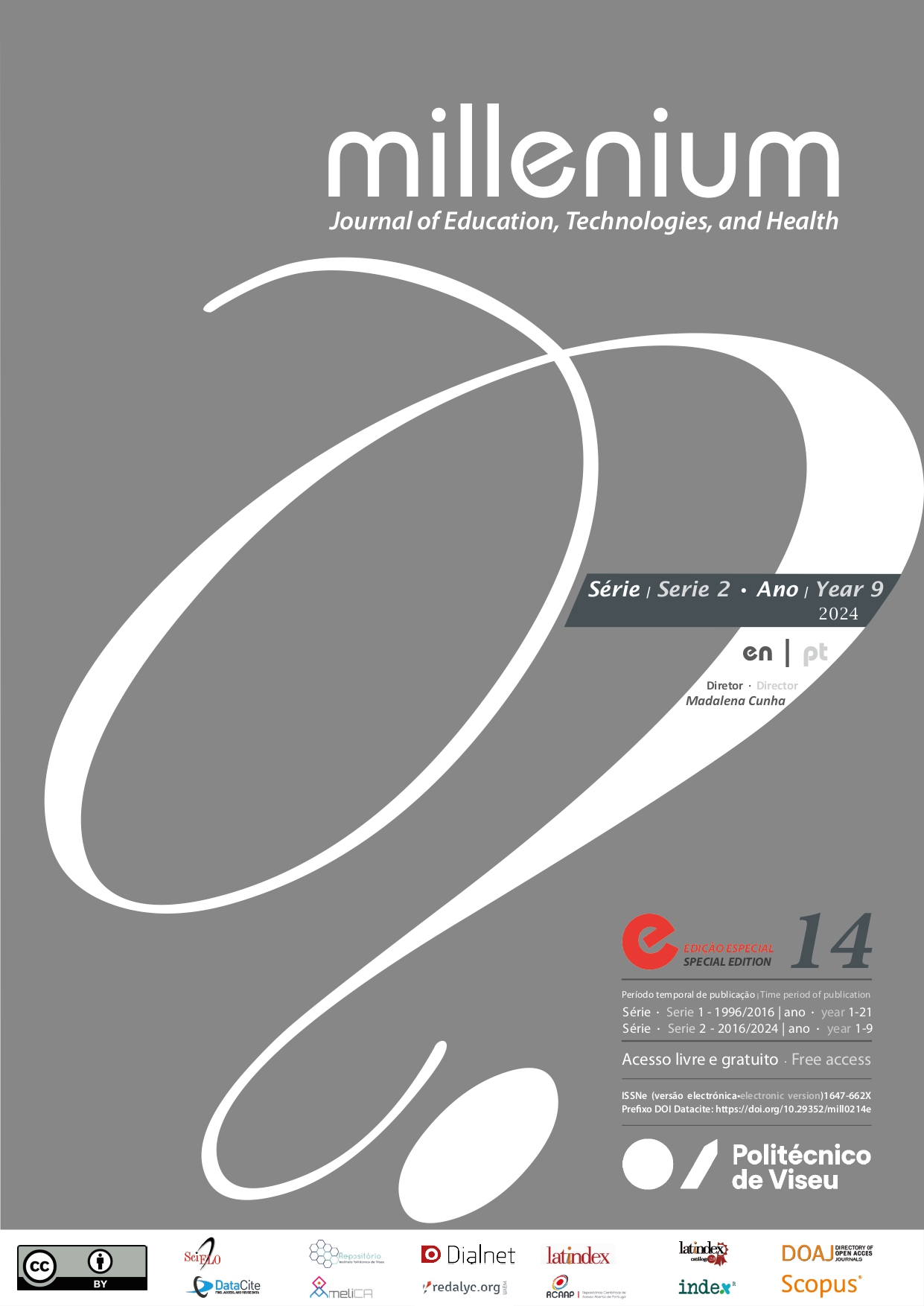Experiencia de los padres sobre la readmisión del niño en el servicio de urgencias pediátricas
DOI:
https://doi.org/10.29352/mill0214e.34080Palabras clave:
enfermería pediátrica; medicina de urgencia pediátrica; readmisión del paciente; mal uso de los servicios de salud; garantía de la calidad de atención de saludResumen
Introducción: Los reingresos de niños/jóvenes al Servicio de Urgencias Pediátricas (SUP) con la misma queja que el ingreso inicial son cada vez más frecuentes, algunas de las cuales son prevenibles.
Objetivo: Analizar la experiencia de los padres en relación a la readmisión del niño/joven en el SUP de la Unidad Local de Salud de Castelo Branco - Hospital Amato Lusitano (ULSCB-HAL).
Métodos: Se trata de un estudio cualitativo, descriptivo y de carácter fenomenológico, sobre la experiencia de los padres respecto a la readmisión del niño/joven en el SUP de la ULSCB-HAL. Se utilizaron entrevistas como instrumento de recolección de datos. Los criterios de inclusión fueron los padres de niños/jóvenes que presentaron episodios de readmisión en los meses de noviembre y diciembre de 2022.
Resultados: La experiencia de los padres con respecto a la readmisión de su niño/joven en el SUP de la ULSCB-HAL se debe principalmente por la creencia de que la situación clínica de su hijo no mejora, es decir, a la preocupación por el estado de salud de su hijo y la consecuente ansiedad. Se destaca una opinión positiva a la atención prestada por los profesionales de la salud, considerándolos atentos y dedicados, existiendo confianza en los cuidados prestados.
Conclusión: La investigación permitió inferir que la intervención dirigida a reducir las tasas de readmisión en SUP es bastante compleja, ya que existen múltiples factores que incentivan el uso inadecuado del SUP.
Descargas
Citas
Akbayram, H. T., & Coskun, E. (2020). Paediatric emergency department visits for non-urgent conditions: Can family medicine prevent this?. European Journal of General Practice, 26(1), 134-139. https://doi.org/10.1080/13814788.2020.1825676
Alele, F. O., Callander, E. J., Emeto, T. I., Mills, J., & Watt, K. (2018). Socio‐economic composition of low‐acuity paediatric presentation at a regional hospital emergency department. Journal of Paediatrics and Child Health, 54(12), 1341-1347. https://doi.org/10.1111/jpc.14079
Alele, F. O., Emeto, T. I., Callander, E. J., & Watt, K. (2019). Non‐urgent paediatric emergency department presentation: A systematic review. Journal of Paediatrics and Child Health, 55(3), 271-277. https://doi.org/10.1111/jpc.14352
Bardin, L. (2016). Análise de conteúdo. Edições 70.
Fortin, M. F. (2009). Fundamentos e etapas do processo de investigação. Lusodidacta.
Gross, T. K., Lane, N. E., Timm, N. L., & THE COMMITTEE ON PEDIATRIC EMERGENCY MEDICINE (2023). Crowding in the emergency department: Challenges and recommendations for the care of children. Pediatrics, 151(3), e2022060971. https://doi.org/10.1542/peds.2022-060971
Haasz, M., Ostro, D., & Scolnik, D. (2018). Examining the appropriateness and motivations behind low-acuity pediatric emergency department visits. Pediatric Emergency Care, 34(9), 647-649. https://doi.org/10.1097/PEC.0000000000001598
Hamline, M. Y., Sauers-Ford, H., Kair, L. R., Vadlaputi, P., & Rosenthal, J. L. (2021). Parent and physician qualitative perspectives on reasons for pediatric hospital readmissions. Hospital Pediatrics, 11(10), 1057-1065. https://doi.org/10.1542/hpeds.2020-004499
Hoge, M. A., Vanderploeg, J., Paris Jr, M., Lang, J. M., & Olezeski, C. (2022). Emergency department use by children and youth with mental health conditions: A health equity agenda. Community Mental Health Journal, 58(7), 1225-1239. https://doi.org/10.1007/s10597-022-00937-7
Kurt, F., Beğde, F., Oğuz, S., Tekin, D., & Suskan, E. (2020). How important are parental age and educational level in nonurgent admissions to the pediatric emergency department?. Pediatric Emergency Care, 36(9), 414–418. https://doi.org/10.1097/PEC.0000000000001886
Martins, M., Marques, R., Sousa, M., Valério, A., Cabral, I., & Almeida, F. (2020). Frequent users of the pediatric emergency department: To know, to intervene and to evaluate - a pilot study. Acta Médica Portuguesa, 33(5), 311-317. https://doi.org/10.20344/amp.12769
McLauchlan, K., Ramlakhan, S., & Irving, A. (2019). Why do parents present to the paediatric emergency department with conditions suitable for management in less acute settings? A qualitative study. European Journal of Emergency Medicine, 27(1), 40-45. https://doi.org/10.1097/MEJ.0000000000000611
Montoro-Pérez, N., Richart-Martínez, M., & Montejano-Lozoya, R. (2023). Factors associated with the inappropriate use of the pediatric emergency department. A systematic review. Journal of Pediatric Nursing, 69, 38-46. https://doi.org/10.1016/j.pedn.2022.12.027
Rafael, M. S., Portela, S., Sousa, P., & Fernandes, A. (2017). Utilização do serviço de urgência pediátrica: A experiência de um centro português. Scientia Medica, 27(1), 1-8. https://doi.org/10.15448/1980-6108.2017.1.24919
Serviço Nacional de Saúde & Administração Central do Sistema de Saúde, IP. (2022). Circular normativa nº 11/2022/ACSS: Para: ARS, ULS, hospitais e centros hospitalares do SNS. ACSS. https://www.ulsna.min-saude.pt/wp-content/uploads/sites/7/2022/08/Circular_Normativa_11_2022.pdf
Serviço Nacional de Saúde (2023). Monitorização do SNS: Serviços de urgência. https://www.sns.gov.pt/monitorizacao-do-sns/servicos-de-urgencia/
Smyth, B. M., Ainscough, G., & Payne, J. L. (2020). Modes of communication between high-conflict separated parents: Exploring the role of media multiplexity and modality switching. Journal of Family Communication, 20(3), 189-205. https://doi.org/10.1080/15267431.2020.1754826
Zhou, H., Roberts, P. A., Dhaliwal, S. S., & Della, P. R. (2019). Risk factors associated with pediatric unplanned hospital readmissions: A systematic review. BMJ open, 9(1), e020554. https://doi.org/10.1136/bmjopen-2017-020554
Descargas
Publicado
Cómo citar
Número
Sección
Licencia
Derechos de autor 2024 Millenium - Journal of Education, Technologies, and Health

Esta obra está bajo una licencia internacional Creative Commons Atribución 4.0.
Los autores que sometan propuestas para esta revista estarán de acuerdo con los siguientes términos:
a) Los artículos serán publicados según la licencia Licença Creative Commons (CC BY 4.0), conforme el régimen open-access, sin cualquier coste para el autor o para el lector.
b) Los autores conservan los derechos de autor y conceden a la revista el derecho de la primera publicación, se permite la divulgación libre del trabajo, desde que sea correctamente atribuida la autoría y la publicación inicial en esta revista.
c) Los autores están autorización para firmar contratos adicionales separadamente, para la distribución no exclusiva de la versión del trabajo publicada en esta revista (ej.: publicar en un repositorio institucional o como capítulo de un libro), con reconocimiento de la autoría y publicación inicial e esta revista.
d) Los autores tienen permiso y son alentados a publicar y distribuir su trabajo on-line (ej.: en repositorios instituciones o en su página personal) ya que eso podrá generar alteraciones productivas, así como aumentar el impacto y la citación del trabajo publicado.
Documentos necesarios para la sumisión
Plantilla del artículo (formato editable)





